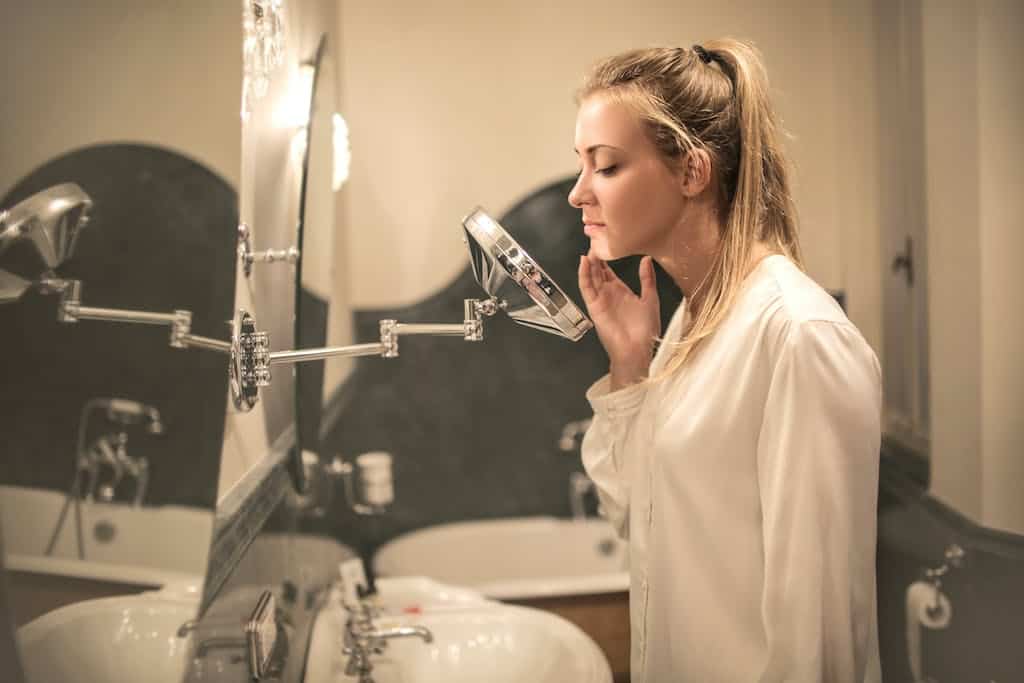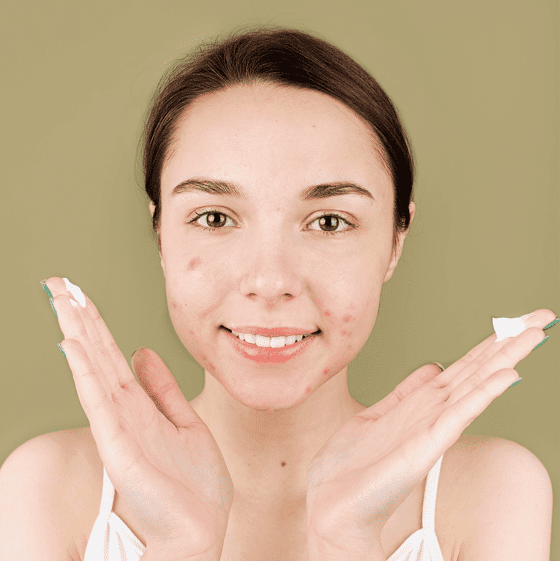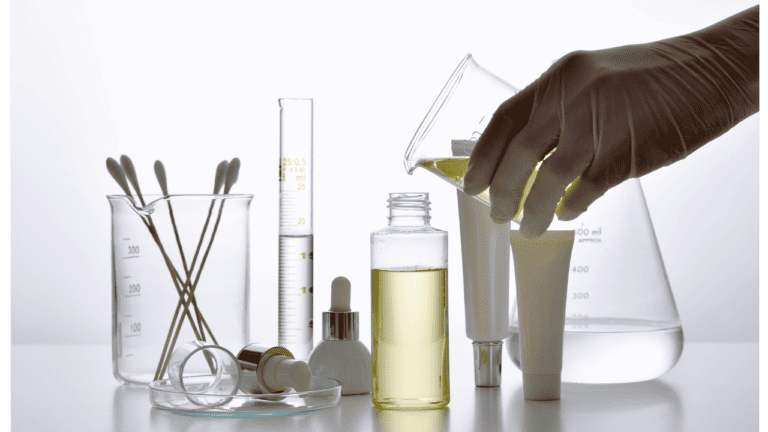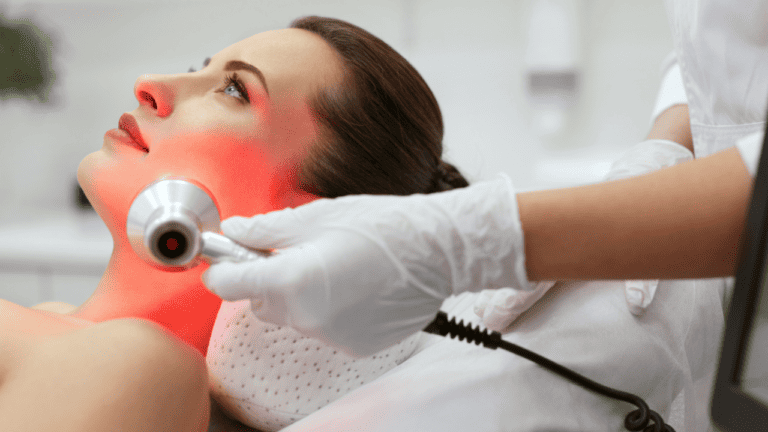Acne scars may appear worse in different mirrors due to variations in mirror quality, magnification, and lighting conditions. Distorted or magnifying mirrors can exaggerate imperfections, and certain lighting can either highlight or soften the appearance of scars. Additionally, personal perception influenced by mood and self-esteem can also alter how we see our scars in various mirrors.
Key takeaways
- Mirror quality and lighting significantly impact how acne scars appear.
- Skincare routines and professional treatments can effectively manage scars.
- Perception of scars is influenced by psychological and environmental factors.
11 Ways Mirrors Make Acne Scars Look Worse
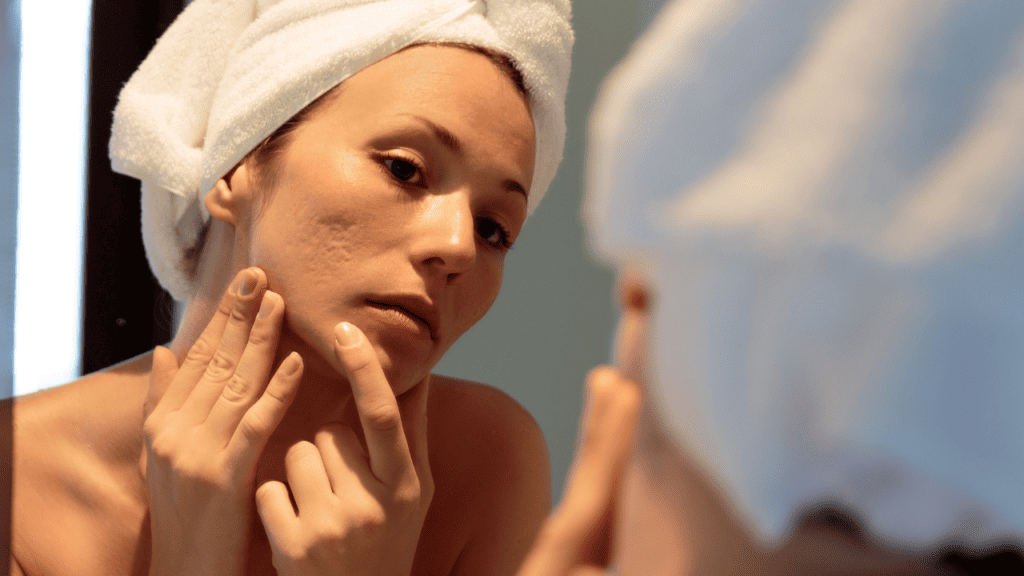
1. Glass Quality
High-quality, flat glass mirrors provide a clear and accurate reflection. In contrast, lower quality glass can have slight waves or imperfections, leading to subtle distortions that can exaggerate features like acne scars.
2. Backing Material
The material used to coat the back of the mirror (usually a reflective metal like aluminum or silver) can affect the clarity of the reflection. Thinner or uneven coatings can create distortions.
3. Mirror Thickness
Thicker mirrors are less likely to warp, whereas thinner mirrors can bow over time or due to mounting, causing distortions in the reflection. This warping can exaggerate or alter the appearance of facial features, including scars.
These top 3 points so far will tell you that good mirrors that do not warp major or minor features are most likely going to be heavy.
4. Shape and Curvature
- Concave Mirrors: These mirrors curve inward, like the inside of a spoon. They can magnify the reflection, making acne scars appear larger and more prominent.
- Convex Mirrors: These mirrors bulge outward. They can make the reflection appear smaller and might minimize the appearance of scars, but can also distort facial features.
5. Mirror Coatings and Effects
The coating on a mirror can also impact the visibility of acne scars. Some mirrors have a slight tint or are designed to diffuse light, which can either soften or dramatize the appearance of scars. For example, a mirror with a yellowish tint might warm up your complexion, potentially making red or dark scars less noticeable. In contrast, mirrors with a bluish tint can make the skin appear cooler, possibly highlighting redness or dark spots. Similarly, acne scars may look worse in some pictures due to high-resolution cameras, lighting and angles, these factors certainly impact the appearance of your acne scars.
It’s crucial to understand that no mirror can show an entirely accurate image of your skin. Each has its nuances, affecting how we see our acne scars. Recognizing this can help in managing expectations and reducing undue stress about your appearance.
6. Manufacturing Defects
When mirrors are manufactured, they go through a process of shaping, polishing, and coating. Defects can occur at any of these stages and cause ripples or bumps in the glass leading to distorted reflections.
Similarly, uneven application of the reflective coating can lead to areas that reflect differently, altering how acne scars and other features appear.
To ensure you get a good mirror, it’s advisable to purchase from reputable manufacturers. Look for mirrors labeled as ‘distortion-free’ or ‘high-definition.’ These are typically made with high-quality glass and precise manufacturing processes. Also, inspect the mirror in person if possible, looking at it from various angles and distances to check for distortions.
7. Age, Deteroriation and Antique Mirrors
Over time, mirrors can deteriorate. This deterioration often starts at the edges and can create a ‘foxing’ effect, where parts of the mirror look darker or less reflective. Older mirrors might also develop scratches or lose their perfect flatness, leading to a distorted image.
The backing can corrode or peel, the glass can become stained, and the reflective coating could have worn of, all of which can alter the reflection and make skin texture, including scars, appear different.
8. Edges, Are they Bevelled or Not
Near the edges of some mirrors, particularly those with beveled edges, the reflection can be slightly distorted, stretching or compressing facial features, which might accentuate acne scars.
9. Two-Way Mirrors:
These mirrors are partially reflective and partially transparent, the varying light transmission and reflection can create unusual effects on the appearance of scars.
Two-way mirrors, also known as one-way mirrors or semi-transparent mirrors, are more common than many people realize. They have a reflective coating on one side and are transparent from the other, under certain lighting conditions.
This is why they are often used in observational settings, such as police interrogation rooms. However, they are also found in everyday places. Restaurants, boutiques, and public restrooms may use them for aesthetic or architectural purposes, or for added security.
10. Smart Mirrors
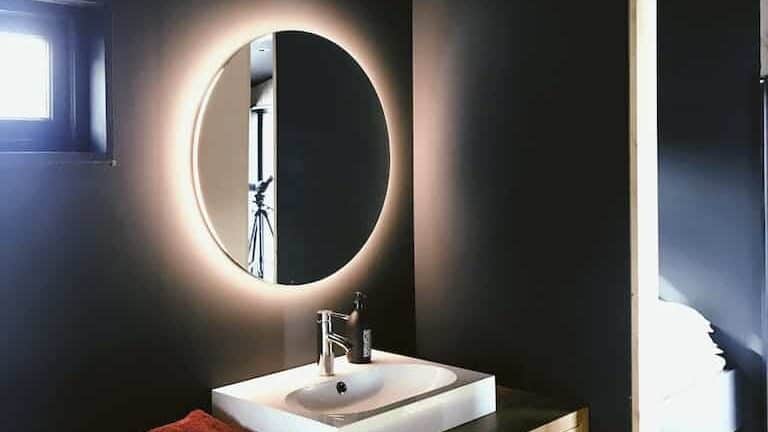
These modern mirrors with built-in lighting and digital features can alter the way light interacts with your face, potentially changing the appearance of acne scars.
Natural light, generally considered the most flattering, provides a balanced view of the skin. It doesn’t exaggerate imperfections and offers a realistic perspective of your acne scars. However, the time of day can affect this; for instance, the harsh midday sun might cast shadows, emphasizing texture and scarring.
Fluorescent lighting, commonly found in office buildings or stores, is less forgiving. It tends to highlight imperfections, including acne scars, and can make them appear more severe. This type of lighting can also drain the color from your skin, leading to a more tired and uneven complexion.
11. Mirror Positioning
The angle at which a mirror is mounted can affect the reflection. If it’s tilted slightly upward or downward, it can stretch or compress your reflection, altering the appearance of your face and scars.
How To Handle Uncertainty About Appearance

Living with acne-prone scars can be a journey marked by fluctuating perceptions of self-image, often leaving individuals in a state of confusion and uncertainty about their appearance.
Imagine starting your day feeling confident and comfortable in your skin, only to catch your reflection in a different mirror and suddenly see your scars appear more prominent than you remembered.
This jarring contrast is not just a matter of personal perception but is significantly influenced by factors beyond one’s control, such as the quality of the mirror, lighting conditions, and even the surrounding environment.
Your acne scars do not define you
It’s crucial to understand that these external variables can drastically alter the appearance of acne scars, and they do not necessarily represent an accurate portrayal of your true appearance.
This understanding is essential in fostering self-acceptance and resilience. Rather than being disheartened by these inconsistent reflections, it’s important to recognize that they are mere distortions, and our worth and beauty are not defined by them. Remember, the variability in how we and others perceive acne scars is often a trick of light and glass, not a true measure of our appearance or self-worth.
Refrain from Constantly Checking the mirror
Our perception of acne scars can be significantly influenced by the frequency and context of looking in the mirror. Constantly checking your reflection can lead to a distorted perception, often magnifying any skin imperfections. This phenomenon, known as the “mirror effect,” can exacerbate concerns about acne scars, making them seem worse than they are.
Understanding this psychological aspect can help in managing how we view our skin. Limiting mirror checks to essential times, like during skincare routines, can reduce the fixation on imperfections and offer a more balanced perception of your acne scars.
our mood also affects how we see ourselves
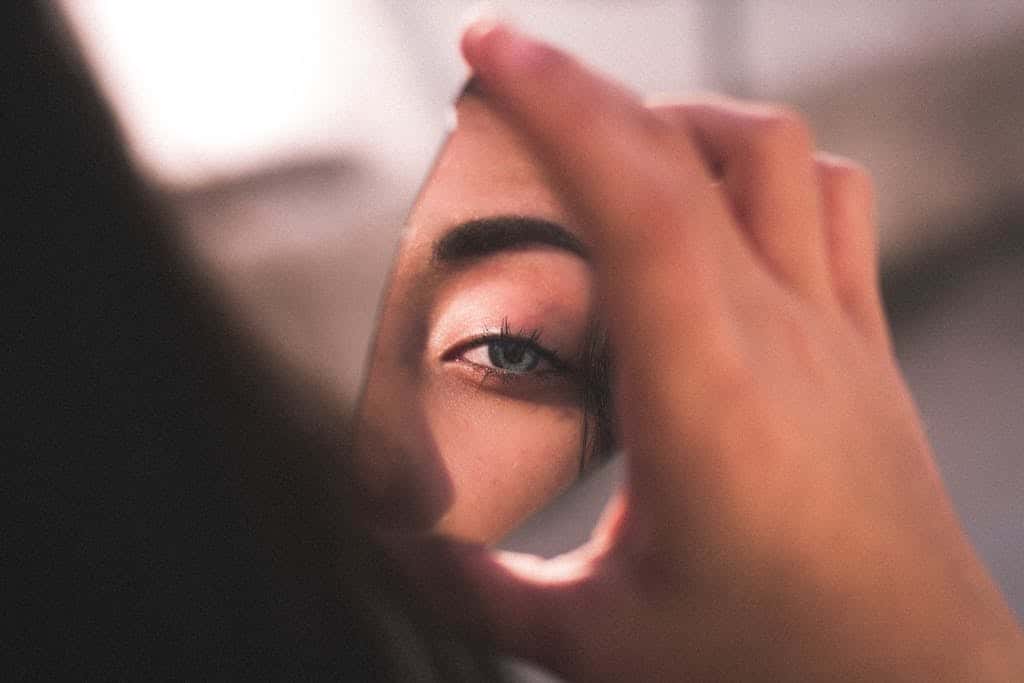
Our mood and self-esteem play a significant role in how we perceive our appearance. When we feel good about ourselves, we’re likely to view our acne scars more positively, seeing them as just a minor aspect of our overall appearance. Conversely, on days when our mood is low or we’re feeling self-conscious, every imperfection, including acne scars, can seem amplified.
It’s important to cultivate a healthy relationship with your skin. Recognizing that acne scars don’t define your beauty or worth can help in building a more positive self-image. Practices like mindfulness and positive affirmations can be beneficial in improving mood and self-esteem, subsequently affecting how we view our skin in the mirror.
How To Choose The Right Mirror For Yourself

Selecting the right mirror for your home can help you be sure of yourself, and how your acne scars actually look. Of course, acne scars do not define you, but if it helps you get rid of the fear of uncertainty of how others perceive you, having the right mirror will help.
This helps you go out with the right frame of mind as well knowing that if your acne scars look different, the mirror might just not be reflecting you as you are, but has features that changes your image.
- Opt for Non-Magnifying, Distortion-Free Mirrors: These provide a realistic view of your skin.
- Utilize Natural Light When Possible: This gives the most accurate representation of your skin.
- Avoid Harsh Fluorescent Lighting Near Your Mirror: It can exaggerate the appearance of scars.
- Check for Glass Quality: High-quality glass is key for a clear image. Look for mirrors labeled as having ‘distortion-free glass’ or ‘high-definition glass’.
- Choose Mirrors with a Flat Surface: Curved surfaces, even subtle ones, can distort images. A perfectly flat mirror ensures the reflection isn’t altered.
- Inspect the Reflective Coating: The best mirrors have a high-quality reflective coating (usually silver or aluminum). Ensure it’s evenly applied and free from defects.
- Prefer Silvered Mirrors Over Aluminum: Silver-coated mirrors generally provide a clearer, more consistent reflection compared to aluminum-coated ones.
Practical Tips for Dealing with Acne Scars
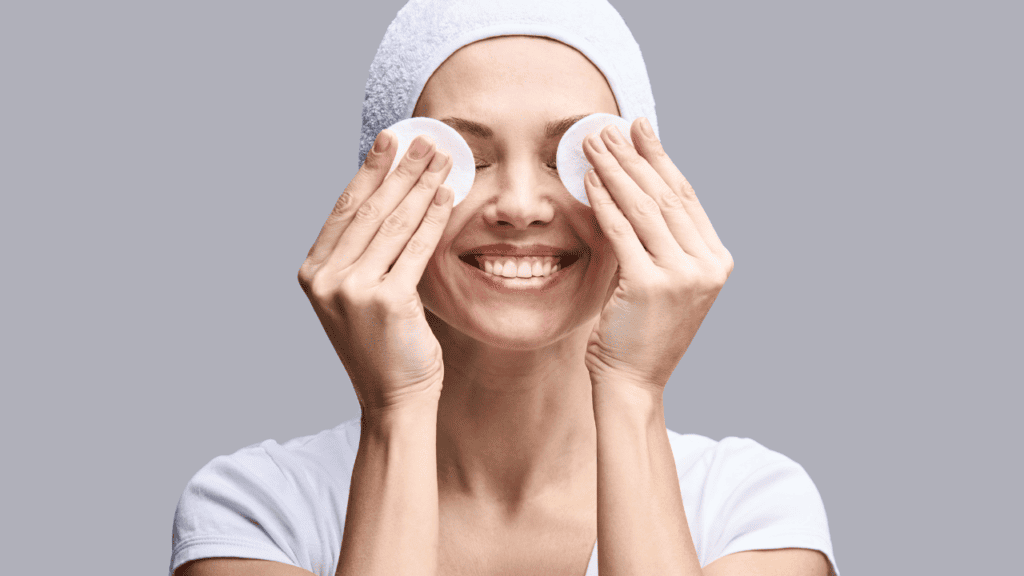
Skincare Routine
An effective skincare routine can make a significant difference in the appearance of acne scars. Here are some key elements to consider:
- Gentle Cleansing: Choose a mild cleanser that doesn’t strip your skin of its natural oils. Over-cleansing can irritate acne scars and make them more prominent.
- Regular Exfoliation: Exfoliating helps to remove dead skin cells, promoting new cell growth. However, it’s essential to not over-exfoliate, as this can damage the skin and worsen scars.
- Hydration and Moisturization: Keeping your skin hydrated helps in maintaining its elasticity and smoothness, which can minimize the appearance of scars.
- Sun Protection: Sun exposure can darken acne scars and prolong their healing. Using a broad-spectrum sunscreen daily is crucial.
- Scar-specific Treatments: Products containing ingredients like retinol, vitamin C, and hyaluronic acid can help in reducing the appearance of scars over time.
Professional Treatments
For more persistent acne scars, professional treatments can be an option. These include:
- Laser Therapy: Effective for reducing the appearance of scars by removing the top layer of skin and promoting collagen production.
- Microneedling: Involves pricking the skin with tiny needles to stimulate the skin’s healing process.
- Chemical Peels: These remove the top layer of skin, helping to reduce the depth of scars.
Consulting with a dermatologist is essential before undergoing these treatments.
FAQs
Why do my acne scars look different in various mirrors?
Acne scars can appear differently due to mirror quality, lighting, and the type of mirror (such as magnifying or distortion-free mirrors).
How can I choose the right mirror and lighting for viewing my skin?
Opt for non-magnifying, distortion-free mirrors and use natural light when possible to get the most accurate view of your skin.
Can lighting really change how my acne scars look?
Absolutely. Different lighting conditions, like natural light or fluorescent lighting, can significantly alter the appearance of acne scars.
